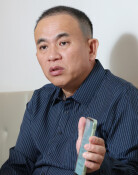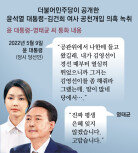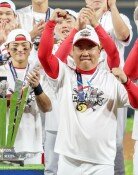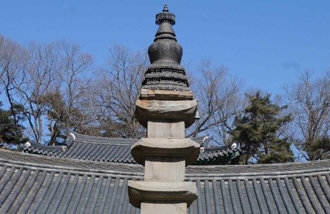Voters in Seoul metropolitan area do not favor either party
Voters in Seoul metropolitan area do not favor either party
Posted June. 16, 2023 07:58,
Updated June. 16, 2023 07:58
Voters do not favor either party 300 days before next year's April general elections. Public sentiment in the Seoul metropolitan area, which will serve as the primary battleground for the April general elections next year, remains evenly split between the ruling People Power Party and the main opposition Democratic Party of Korea. A recent public survey conducted by The Dong-A Ilbo between Friday and Monday questioned 2,405 voters residing in Seoul, Gyeonggi Province, and Incheon about their preferred party's candidate for the next year's general election. The survey results indicated that the People Power Party garnered 30.8 percent support in Seoul, 30.6 percent in Gyeonggi Province, and 30.8 percent in Incheon, while the Democratic Party secured 35.1 percent support in Seoul, 37.4 percent in Gyeonggi Province, and 35.7 percent in Incheon. It is important to note that the Democratic Party was slightly ahead in the survey, although the difference falls within the margin of error of ±3.5 percent.
Voter trends in the Seoul metropolitan area, often referred to as the melting pot of public sentiment, have consistently played a pivotal role in determining election outcomes. Historically, the ruling party and the opposition party have exerted dominance in their respective regions, such as Yeongnam and Honam areas. As a result, the results of the elections have heavily relied on the voter trends observed in the Seoul metropolitan area. The parties that performed well in these areas during the 19th, 20th, and 21st general elections were able to secure a majority in the national assembly, granting them a significant advantage. Consequently, both parties are now vigorously competing to win over voters in the area.
It is worth noting that the priority of keeping the administration in check leads by 10 percentage points over stabilizing the administration. The forthcoming general election, scheduled to take place in the third year of the Yoon Suk Yeol administration, will serve as a crucial moment for the public to assess its performance. The prevailing sentiment reflects a negative perception characterized by a perceived lack of cooperation between political parties and ineffective communication with the people. Controversies surrounding the appointment of individuals with a prosecutorial background to key positions in the presidential office and ministries have contributed to this sentiment, with its failure to improve the Korean economy since the launch of the administration.
However, the approval ratings of the Democratic Party are not matching the response rate of holding the administration accountable. Despite public criticism of the Yoon administration's governance, the main opposition party, responsible for ensuring checks and balances, is failing to fulfill its role effectively. This can be attributed to the party's involvement in numerous controversies and scandals, such as hasty legislation, exemplified by the passing of the Food Grains Management Act, bribery allegations related to a party convention, the crypto scandal involving Rep. Kim Nam-kuk, and a perceived focus on internal factional battles within the party. The Democratic Party must not delay in implementing substantial reforms to address outdated practices.
Almost 30 percent of respondents stated that they were undecided about which party to align with, indicating a lack of trust in both parties among the Korean people. These undecided voters hold the decisive vote in the end. They prioritize issues directly affecting their lives rather than partisan affiliations. Therefore, the two parties should concentrate on improving the lives of the Korean people instead of pursuing their own party interests.
Headline News
- N. Korea conducts ICBM test ahead of U.S. presidential election
- Samsung Electronics to expand 5th Gen HBM Sales in Q4
- Gov’t flags possible tax evasion among pension exemption applicants
- Draft of U.S.-brokered 60-day truce between Israel and Hezbollah leaked
- Half of working seniors earn less than 1 million won per month







